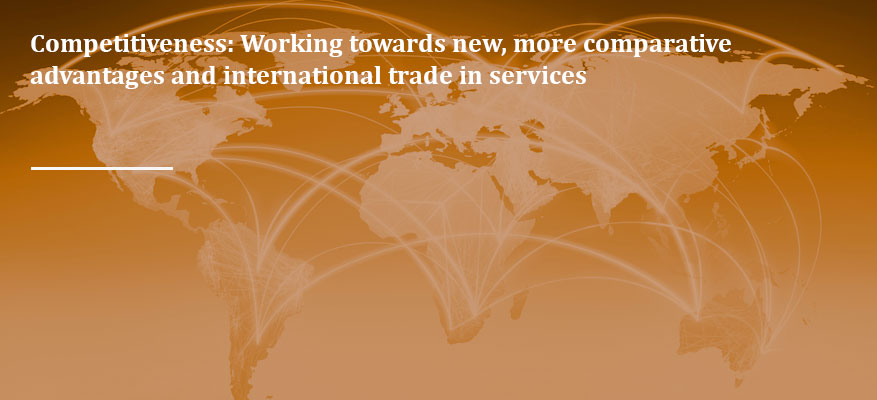Competitiveness

The rationale
- Services bring new sources for competitive advantages in both developed and developing economies. Many regions and countries look for smart specialization and diversification strategies that need services to be effective. Services provide new sources of growth than can be more resilient to commodity cycles and industrial delocalization trends. Services may also help diversification within agriculture, mining, energy and manufacturing products by increasing their added value and integration in global value chains.
How to address the challenges
- Identifying the current state of service competitiveness.
- Assessing services in Foreign Direct Investment, international trade and other domains.
- Understanding factors explaining competitiveness or creating constraints in services.
- Benchmarking with competing countries.
- Understanding the role of regulations and international trade agreements in services.
- Assessing the right balance between horizontal and vertical policies in services’ competitiveness.
- Launching pilot programs for service competitiveness and internationalization.
The Challenges
- Improving the competitiveness of the services economy.
- Boosting the transformative capacity of services for economic diversification.
- Improving services’ competitiveness vis-à-vis goods industries.
- Promoting new service industries as new competitive advantages.
- Integrating services in global value chains.
Our products
- Diagnosis on services’ competitiveness and identification of potential competitive advantages.
- International benchmarking and best practices.
- Expert advice for policies oriented to services’ competitiveness, like services growth, services experts, etc.
- Strategies and plans for services’ internationalization.

Luis RubalcabaDirector
Professor of Economic Policy, Department of Economics and Business Administration, University of Alcalá. Previous academic positions include: visiting Fulbright Schuman Scholar at Boston University, (US), distinguished professor at VTT-Tekes (Finland), honorary scholar at the University of Birmingham (UK) and president of the RESER scientific association (European Association for Services Research). Staff positions at international institutions: The World Bank Group, Washington, DC, USA (2012-2016, specialist within the Trade and Competitiveness Global Practice) and European Commission, Brussels, Belgium (2002-2004; policy officer in DG Enterprise and Industry – previously, analyst at Eurostat based in Luxembourg, 1989-1990). He has led projects for some EU governments, business organizations and well as for the European Commission, the OECD, the United Nations, the Inter-American Development Bank and the World Bank Group. In developing economies, he has been working in countries such as Ecuador, Uruguay, Kazakhstan, Dominican Republic, Jordan, and Jamaica. He has published in more than 100 international publications on services.
SELECTED PUBLICATIONS & REPORTS
Books and book chapters
- Rubalcaba, L. (2017) Competitiveness. In Richardson, D. et al. (Eds) The International Encyclopedia of Geography. People, the Earth, Environment and Technology. Wiley-Blackwell DOI: 10.1002/9781118786352.wbieg0585
- Rubalcaba, L. and Toivonen, M. (2015). Internationalization of services: modes and the particular case of Knowledge-intensive business services. In Peter Daniels and John Bryson (Eds) The Handbook of Service Business. Edward Elgar.
- Rubalcaba, L., and Visintin, S. (2010) Crossing borders: exploring the relationships between different modes of international provision of services. In Business service, competitiveness and internationalization, Rubettino Editore, Roma, Italy
- Rubalcaba, L. (2007) The New Service Economy: Challenges and Policy implications for Europe. Edward Elgar, Glos (UK) and Massachussets (US).
- Rubalcaba, L. and Kox, H. (Eds) (2007) The Contribution of Business Services to European Economic Growth. Palgrave-MacMillan, London (UK) and New York (US)
- Rubalcaba, L. and Van Welsum, D. (2007), Globalisation and Global Sourcing in Business Services.In The Contribution of Business Services to European Economic Growth. Edited by Luis Rubalcaba and Henk Kox. Palgrave-MacMillan, pp. 213-230.
- Cuadrado, J. R., Rubalcaba L., and Bryson J. (Eds) (2002) Trading Services in the Global Economy. Edward Elgar Glos (UK) and Massachussets (US)
- Rubalcaba, L. (1999) Business Services in European Industry: Growth, Employment and Competitiveness. European Commission, Brussels.
Articles
- Di Meglio G, Stare M, Maroto A, and Rubalcaba, L. (2015). Public services performance: an extended framework and empirical assessment across the enlarged EU. Environment and Planning C: Government and Policy, 33 (2), 321-341.
- Gallouj, F., Weber, M., Stare, M., and Rubalcaba, L. (2015) The futures of the service economy in Europe: a foresight analysis. Technological Forecasting & Social Change. Vol. 94, 80–96.
- Di Meglio, G., Pyka, A. and Rubalcaba, L. (2015),On the ‘How Many Europes’ Debate: Varieties of Service Economies. Journal of Economic and Social Geography (Tijdschrift voor economische en sociale geografie), 106 (3): 307–320.
- Rubalcaba, L., Gallego, J., Gallo MT and Garrido R., (2013). Business services location and market factors in major European cities. Cities. Vol. 31, 258–266.
- Visintin, S., Maroto, A, Di Meglio, G. and Rubalcaba, L. (2010) The Role of Cost Related Factors in the Competitiveness of European Services. The Global Economy Journal (bepress). Vol. 10, Issue 3: 4.
- Stare, M. and Rubalcaba, L. (2009). International Outsourcing of Services – What Role for Central and East European Countries? Emerging Markets Finance and Trade, Vol. 45, 5, 31-46.
- Rubalcaba, L. and Di Megio, G. (2009). Services in the EU competition policy. Journal of Service Science, Vol. 1, 2, 121-146.
- Maroto, A. and Rubalcaba, L. (2008) Service Productivity Revisited. The Service Industries Journal, Vol. 28, 3, 337-353.
